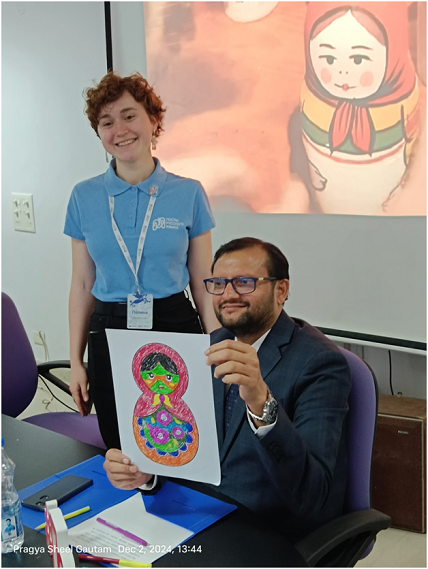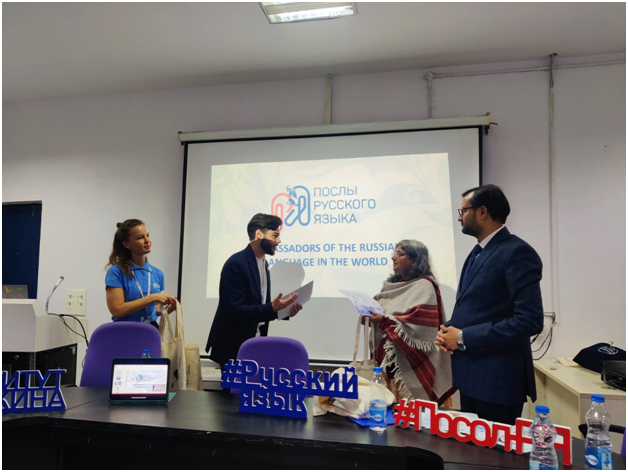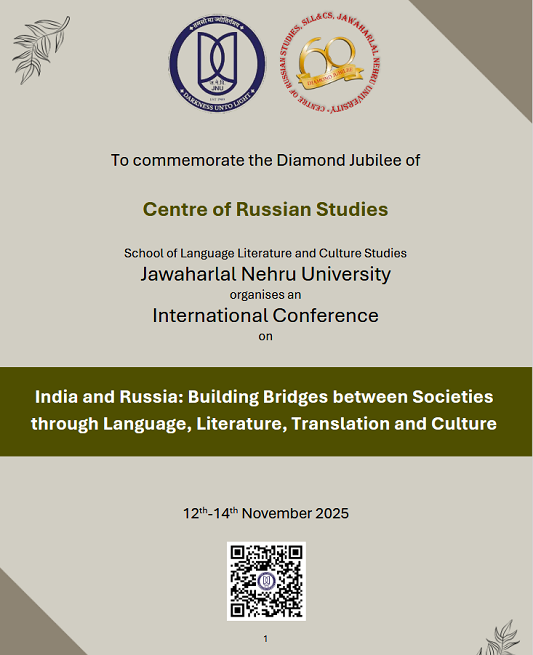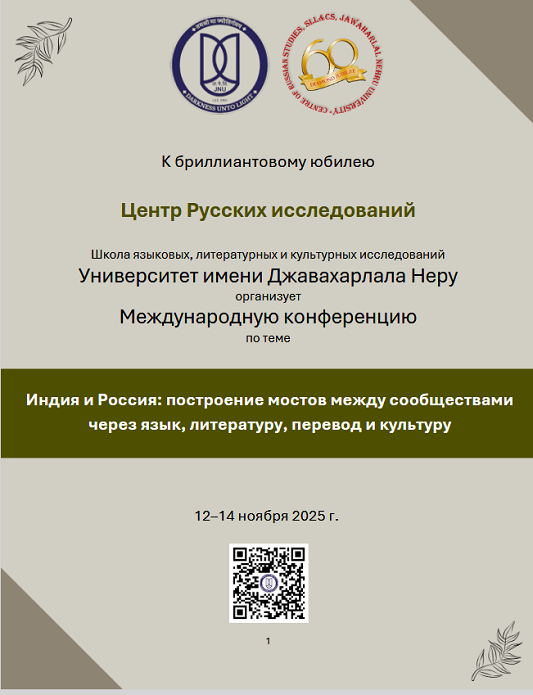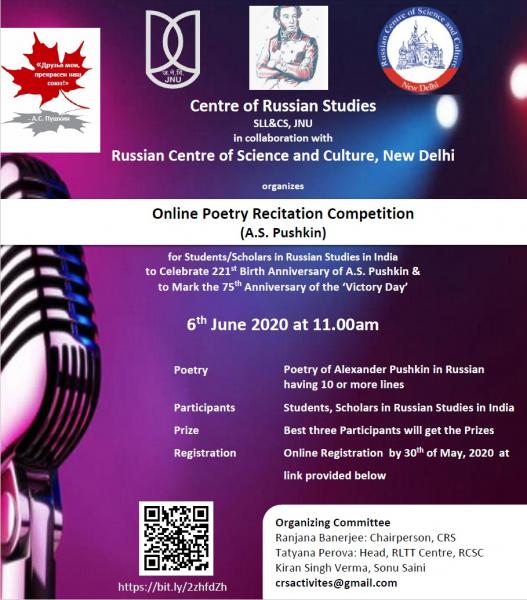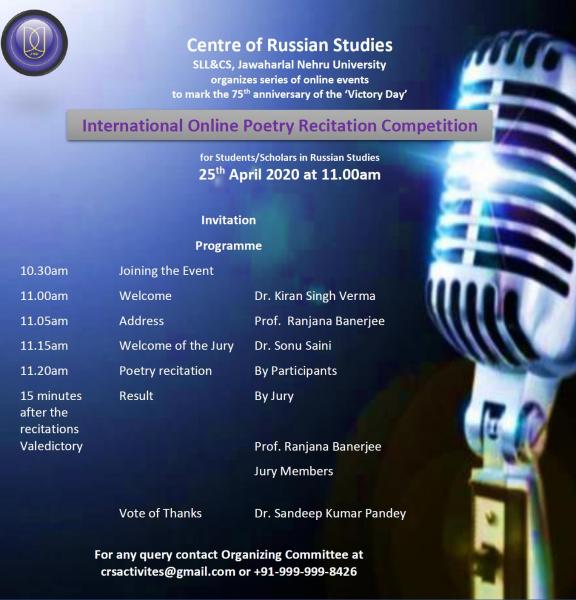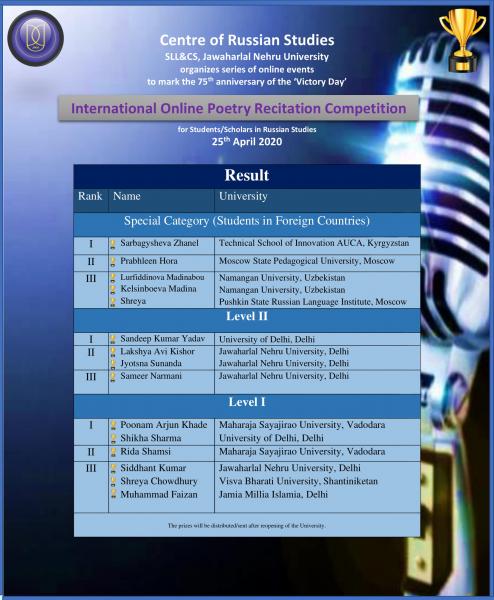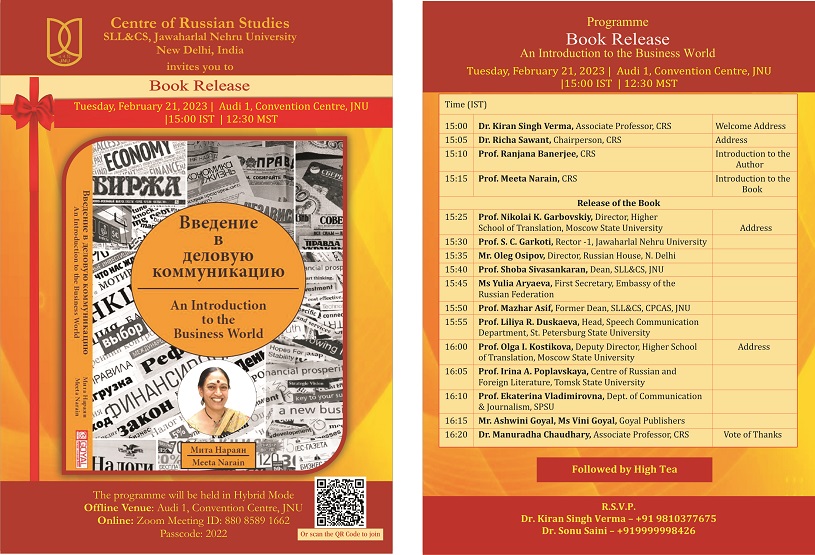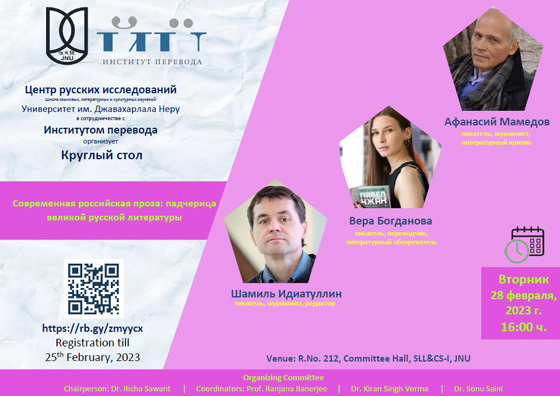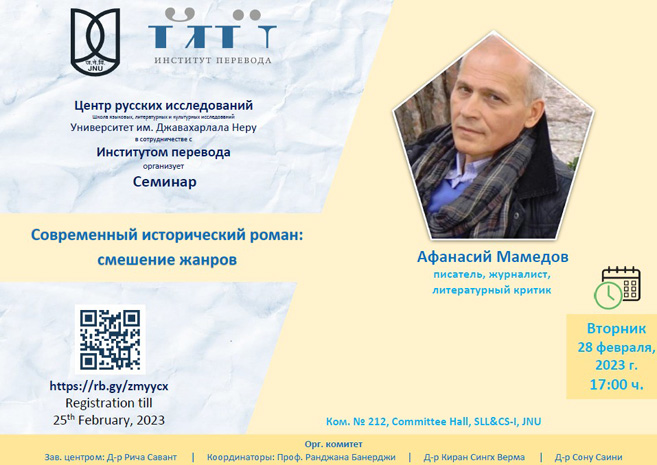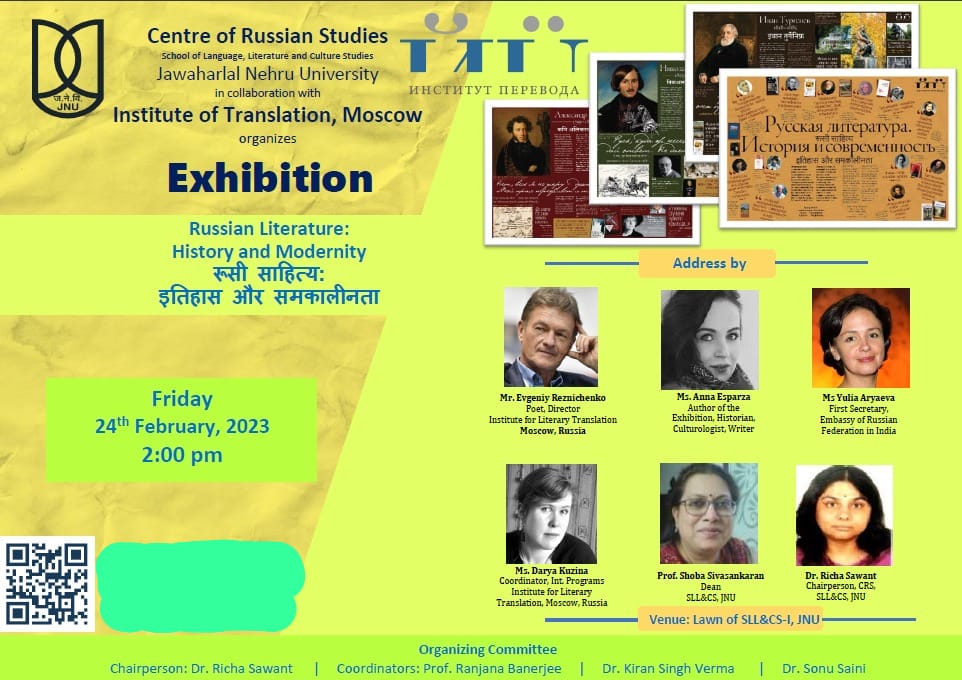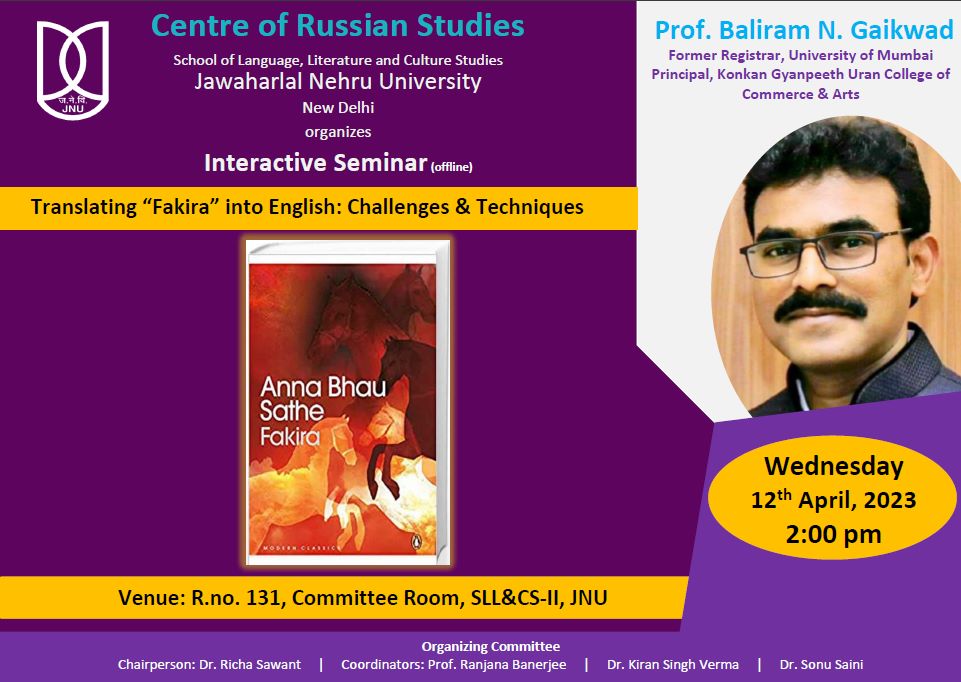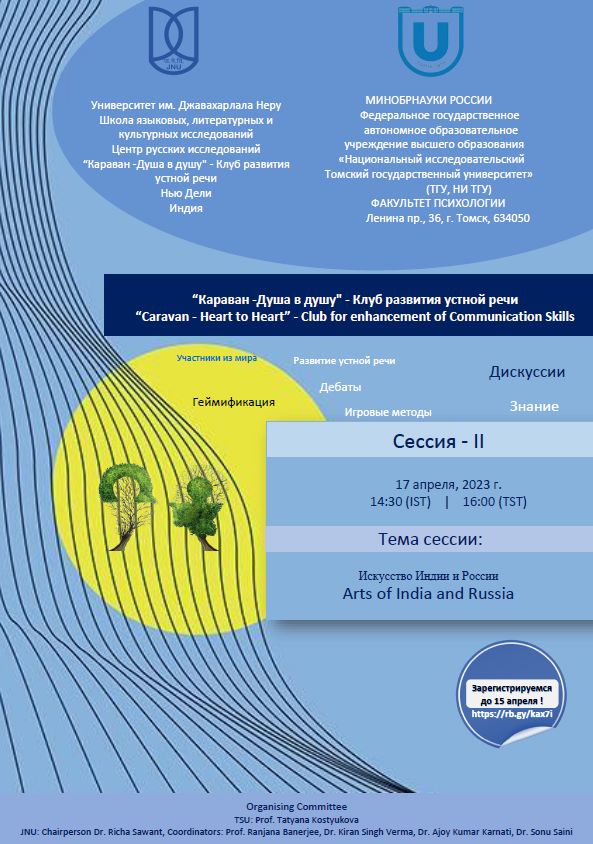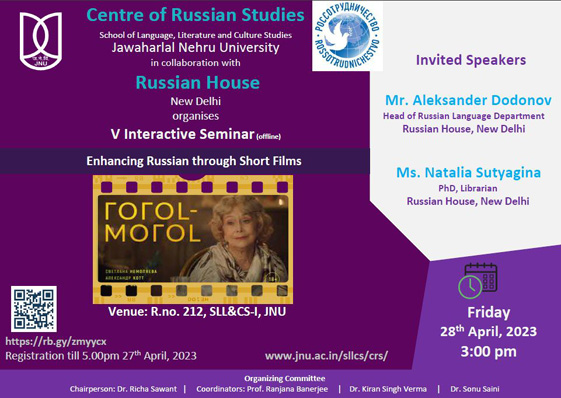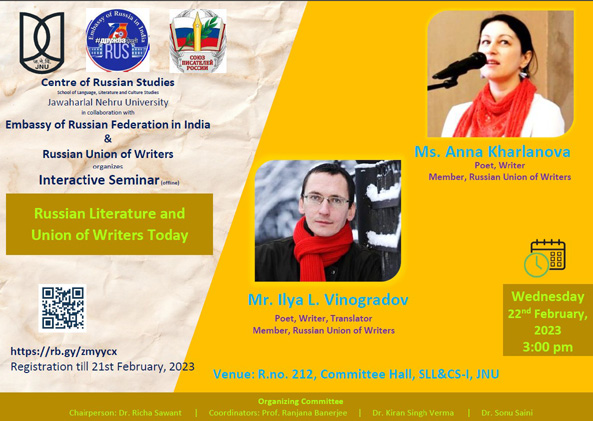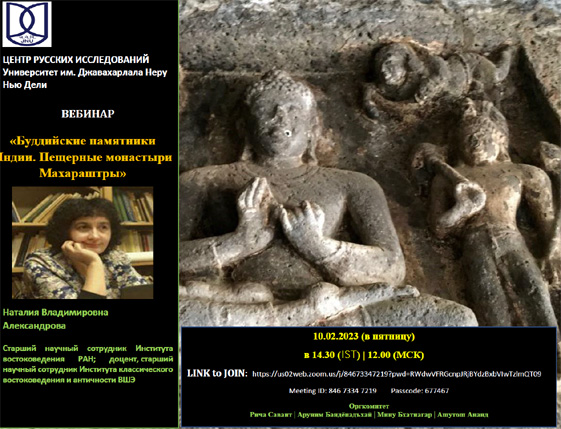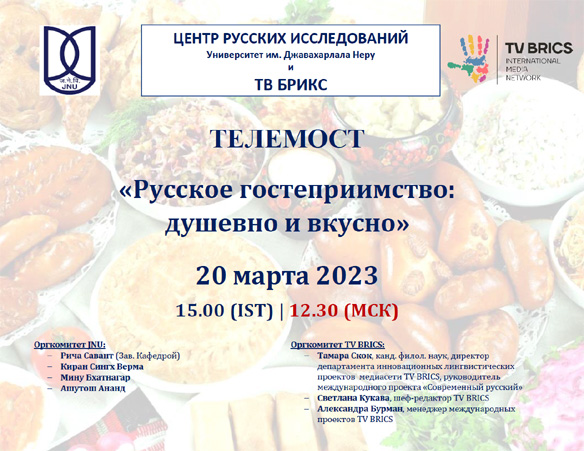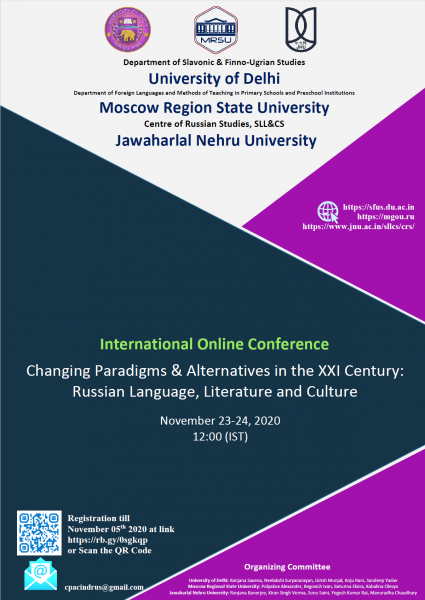
|
Department of Slavonic & Finno-Ugrian Studies Department of Foreign Languages and Methods of Teaching in Primary Schools and Preschool Institutions Centre of Russian Studies, SLL&CS |
|
organizing |
|
International Online Conference |
|
November 23-24, 2020 |
Moving on from the XX to the XXI century, one was clear that we, once again, are living in a world of changed paradigms in all spheres. The impact of the same was visible even before we bade a farewell to the previous century that witnessed systemic changes all over the world. The most noteworthy being the one that led to the fall of the former Soviet Union and set the ball rolling for other countries of that block. It needs to be emphasized that the fall of the communist regimes was also accompanied by vanishing of the ‘welfare states’ in the non-communist block of countries.
Thus, stage was set for the complete take-over by the ‘free-market’ forces. Many things changed – the way we lived and the way we thought, the way we interacted, communicated and the way we expressed ourselves! Starting from the mid-2000s our lives became more and more globalized, digitalized and homogenized.
The impact of these changes was palpably felt on all aspects of life including literature, language and cultures of the ever-changing societies. The claims of ‘end of the ideology’ phase of the end of the XX century also resulted in the claims of ‘end of the book’ debate in the early XXI century. Since the end of the 1980s, the rapid change in Russian language has become a cause of anxiety for many. Experts and commoners, alike, were lamenting the loss, the mutilation of the ‘Russian speech’, pronouncing even death of the Russian language etc.
Russian language, literature and culture negotiated the changed scenario in its own inimitable way. These changes pose substantial challenges in terms of comprehension, as well as, pedagogy. We are already two decades old into the new millennium and the time to comprehend these changes has come.
The proposed online conference is designed to create space for experts, teachers, learners and research scholars for introspection to enhance our collective understanding, as well as, innovative prognoses in order to explore the multiple facets of an alternative thought.
The scholars, specialists, teachers, research scholars of Russian studies from India, Russia and other countries are invited to participate in the conference.
Themes of the Conference
Contemporary Russian Literature
- Key trends in Russian Literature in the XXI Century: Traditional Prose, Post-modernist and Post-Realist Writings
- Reading, Writing, Thinking and Learning in the Electronic Age
- New literary heroes/heroines in times of ontological depression
- Russian Orientalism, the ‘Russian world’ and its reassessment in XXI century
- Experimental and alternative trends/ genres in Russian literature of the XXI century
- Leading names and literary creations and why? – Your list
- Alternative paradigm of book production: the literary text as a multimedia and trans media product.
Contemporary Russian Language
- Main trends in the development of the Russian language of the early XXI century
- Scientific and professional speech culture
- Effect of new technology on communication and language
- Factors of effective speech communication: postulates by H. P. Grice
- Slang and its role in contemporary communication system
- Speech image of the contemporary orator
- New expressions of courtesy: changes in the speech pattern and etiquette
- SMS and Tweet – contemporary epistolary genre
- Russian language in the context of Anglicism, Americanism and pseudo-Anglicism
- Emerging new words and expression in the XXI century
Contemporary Russian Culture
- Ethno-cultural Renaissance in Contemporary Russia
- Revival of religious consciousness in Contemporary Russia
- The Culture of XXI century Russia: Traditions and Innovations
- Theater, television, Internet and the Russian people
- Traditional, religious and secular consciousness in Russia in the XXI century
| Official Language | : | Russian/ English |
| Participants | : | Scholars, Specialists, Teachers, Research Scholars of Russian Studies from India, Russia and other Countries |
| Participation | : | No Charges/fee for Participation |
| Registration | : | Online Registration at Link: https://rb.gy/0sgkqp |
| Last date of Registration & Last date to send the Abstract | : | 5th November 2020 |
| Notification of Acceptance | : | 15th of November 2020 |
| Duration of Presentation | : | 15 Minutes |
| Maximum Number of Participants | : | 500 (on First Come First Serve basis as per registration) |
| Access Link | ; | The registered participants will receive the invitation and link to access the Conference by November 22, 2020 |
| Certificate of Participation | : | Registered Participants, attended the whole programme will receive the e-certificate within one month after the conference |
|
For any query, please email at cpacindrus@gmail.com Registration at Link https://rb.gy/0sgkqp |
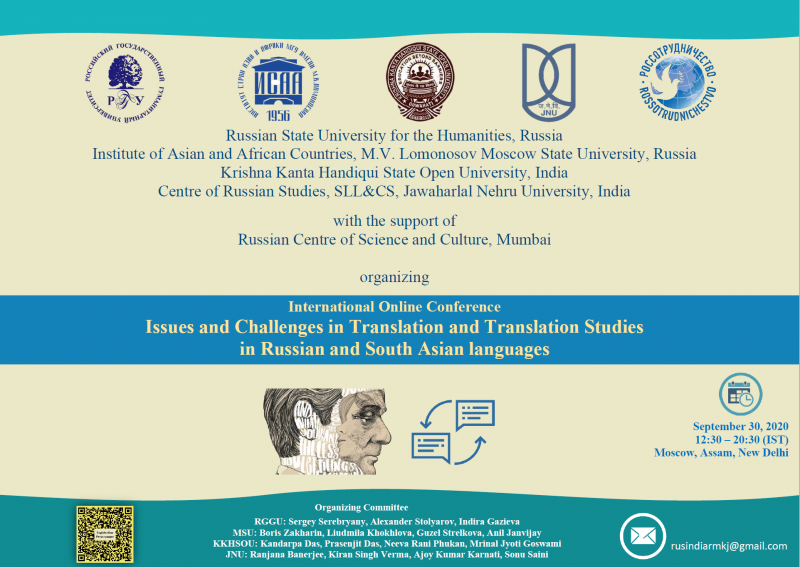
Russian State University for the Humanities, Russia
Institute of Asian and African Countries, M.V. Lomonosov Moscow State University, Russia
Krishna Kanta Handiqui State Open University, India
Centre of Russian Studies, SLL&CS, Jawaharlal Nehru University, India
with the support of
Jawaharlal Nehru Cultural Centre,
Embassy of India in the Russian Federation
Organizing
International Online Conference
Issues and Challenges in Translation and Translation Studies
in Russian and South Asian languages
September 30, 2020
12:30 – 20:30 (Indian Standard Time)
Moscow, Assam, New Delhi
Dear Colleagues!
We invite you to participate in the International Online Conference “Issues and Challenges in Translation and Translation Studies in Russian and South Asian languages”. The experienced researchers and young specialists working in the field of translation are invited to participate in the conference.
Objectives: To discuss the following issues:
- Stylistic issues in translating (fiction, poetic, religious, scientific and others);
- Consecutive and simultaneous interpretation;
- Communicative aspects of interpretation;
- Audio-visual translation: cultural paradigms in translation studies.
The following topics are proposed for discussion:
- South Asian languages and culture in translation
- Professional translation and translator competencies of translators
- From author to translator: cultural paradigms in translation studies
- Modern literary criticism and translation
- Translation of poetry and prose
- The use of videos in teaching interpretation
- Theory, history, methodology of translation
- Translation/Transcreation and Hermeneutics
- Translation as a universal practice
- Other relevant topics
Languages of the Conference: Russian/ Hindi/ English
Registration & Participation:
- No charges for Registration/Participation/Presentation
- Registration through online form at: https://rb.gy/9eup13
- Last date to register online & sending abstract (150-250 words): September 1, 2020
- Notification of Acceptance: September 15, 2020
- Duration of each presentation: 15 minutes including questions-answers
- Maximum number of participants: 500 (on First Come First Serve basis as per registration)
- Access Link: The registered participants will receive the link to access the programme by September 28, 2020
- Full paper of not more than 3000 words having footnotes reference style as per MLA format is to be submitted by November 15, 2020
Certificate and Publication
- e-Certificate: Participants will receive the e-certificate of participants within one month after the conference
- Publication: The selected articles will be invited to be published in the e-proceeding/e-journal
Organizers
- RGGU: Russian State University for the Humanities, Department of Foreign Area Studies and Foreign Policy, Faculty of International Relations and Foreign Area Studies of the Institute of History and Archives, International Center for South Asian Studies (Moscow, Russia)
- MSU: M.V. Lomonosov Moscow State University, Institute of Asian and African Countries, Department of Indian Philology (Moscow, Russia)
- KKHSOU: Krishna Kanta Handiqui State Open University (Assam, India)
- JNU: Centre of Russian Studies, School of Language, Literature and Culture Studies, Jawaharlal Nehru University (New Delhi, India)
- RGGU: Sergey Serebryany, Alexander Stolyarov, Indira Gazieva
- MSU: Boris Zakharin, Liudmila Khokhlova, Guzel Strelkova, Anil Janvijay
- KKHSOU: Kandarpa Das, Prasenjit Das, Neeva Rani Phukan, Mrinal Jyoti Goswami
- JNU: Ranjana Banerjee, Kiran Singh Verma, Ajoy Kumar Karnati, Sonu Saini
For any query, please email at: rusindiarmkj@gmail.com
Register using the link
https://rb.gy/9eup13
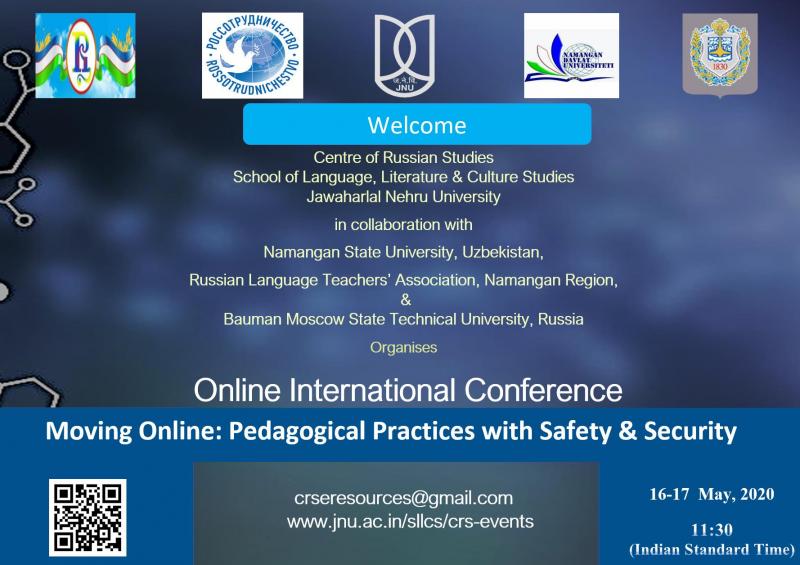
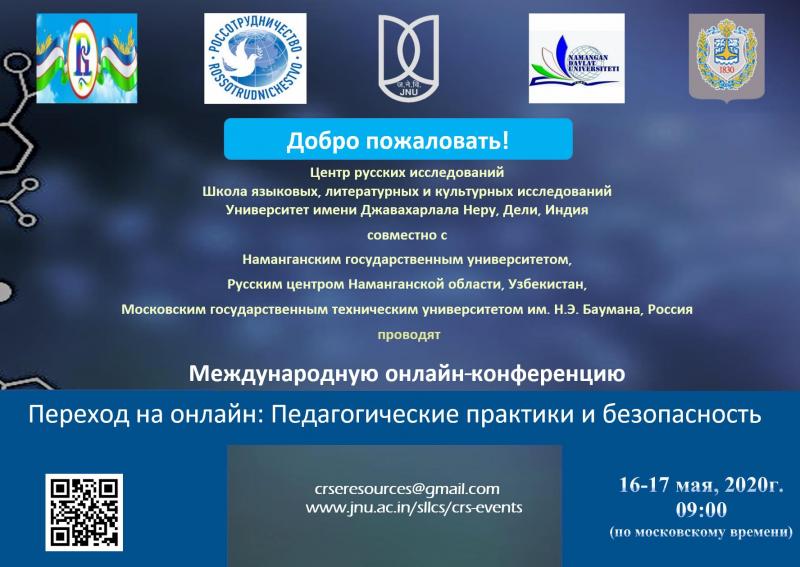
Programme of the Conference in English
Программа конференции на русском
Информационное письмо на русском: Скачать
Online International Conference
Second Circular
Concept Note
Moving Online: Pedagogical Practices with Safety & Security
(16-17 May 2020)
UNESCO reports that more than 190 out of 195 countries around the world have closed their educational institutions as preventive measures in fight with Covid-19 pandemic. More than 90% of the world’s student population are affected due to closure of their educational institutions. However, the institutions worldwide are making all possible efforts to reach out to their students through various means of technology. Today the remote learning or online learning has become the only saviour to facilitate the continuity of education.
The World Bank is actively working with governments of various countries to support their efforts in utilizing educational technologies to provide remote learning opportunities. Education ministries in most of the countries are working to formulate the policies in order to continue the teaching-learning process in their respective countries. The number of users for online teaching and learning has touched the sky overnight due to pandemic situation worldwide. It has been accepted that the most suitable tool today to support continuity of education is remote learning.
But Online learning has its own challenges. The challenges are emerging due to non-availability of network in remote areas, access to suitable devices for online classes, poor network connectivity, technical training to conduct or attend online classes, etc. These issues can be resolved with the time and training but there is one issue which was there in past, present and will be in future, i.e., security and safety during the remote learning or teaching. In our previous International Online Conference “Online Teaching: Learning for Today and Tomorrow” held on 31st March to 1st of April 2020 various discussion and brainstorming sessions were held on online platforms, teaching methods, experience of online teaching etc. More than 500 participants benefited with learning various tools and techniques to conduct online classes in our recent conference.
The upcoming International Online Conference “Moving Online: Pedagogical Practices with Safety & Security being held on 16-17 May 2020 is going to discuss the next step in the remote learning, i.e., security and safety while using online platforms, techniques, etc. The Centre of Russian Studies, SLL&CS, Jawaharlal Nehru University along with Namangan State University, Russian Language Teachers’ Association, Namangan Region and Bauman Moscow State Technical University, Russia cordially invite you to participate in this conference.
The themes for discussion are:
- Best Practices in Online Learning and Teaching
- Safety and Security in Remote Learning
- Copyright Issues while using Technology for Teaching
- Online Teaching through Mobile Phones
- Teaching through Television
- Russian Language, Literature, Translation and Culture in Remote Learning
- Learning Online: Learners’ perspective
Mode of Conference: Online
Languages of the Conference: English / Russian
Registration:
- No charges for Registration/Participation/Presentation
- Each presentation will be of 15-20 minutes including questions-answers
- Registration through online form at: https://bit.ly/3eFO1TL
- Last date to register online and sending the abstract is: 12 May 2020
- Maximum number of participants is 500 (on First Come First Serve basis as per registration)
- The registered participants will receive the link for online access
- The conference can be accessed through Laptops/Mobile (Android/iOS)
Participants:
- The Teachers/ Scholars working in the area of Foreign Language Teaching
- Teachers/ Scholars working in the area of Technology, Information Technology
- Scholars working in the area related to the themes of the conference
Certificate and Publication
- e-Certificate to the participants will be sent to the respective email address after the conference
- The selected articles will be invited to be published in the indexed online proceeding/journal
Organizers
|
Chairperson Ranjana Banerjee
Coordinators Kiran Singh Verma Sonu Saini
|
Aziza Mirzanazarova (Uzbekistan) Zeev Fraiman (Israel) Aigul Amitova (Kazakhstan) Andrei Proletarsky (Russia) Elena Smirnova (Russia)
|
|
www.jnu.ac.in/sllcs/crs-events |
|
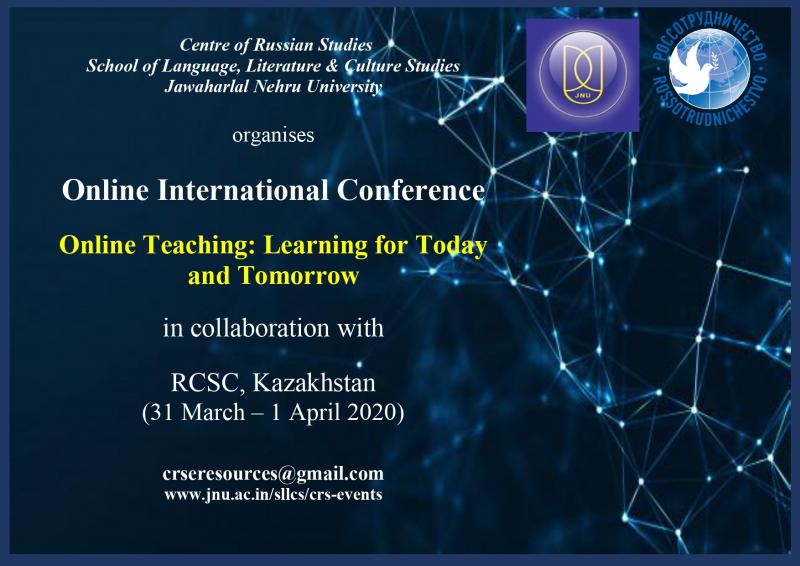
Programme (As per Indian Standard Time)
The previous century has provided us futuristic aspect of teaching and learning through technology. First two decades of the present century has witnessed extensive growth in the use of technology in education across the world. The traditional methods of teaching has become the strong base of the new teaching methods. The technology in education has practically disabled all the barriers or borders between people on the planet. It has proved as savior in difficult times when people are unable to move or gather at one place due to various reasons.
The time has come to acquire some innovative methods of teaching using technology. Such teaching methods enable the teachers or learners barrier free transfer of knowledge and experience. A number of online resources have been developed. The new paradigm of distance education are being innovated using online teaching. Today we have access to various online resources but due to the limitations or other reasons they have not been explored much. There are various platforms for teaching distinctive subjects through technology, and this has become an integral part of education today. For sharing the specific features of these platforms and e-resources, specifically related to Russian language, the Centre of Russian Studies, School of Language, Literature and Culture Studies, Jawaharlal Nehru University, in collaboration with Russian Centre of Science and Culture, Kazakhstan, is organizing an International Conference on Online teaching and learning process. The themes for discussion are:
- Online Learning and Teaching
- Online Teaching Tools
- Online Testing Tools
- Innovative teaching methods using technology in FLT
- Applications on Android/iOS for learning Russian
- Russian Language and Literature through Technology
- Russian through Games
- Others
Mode of Conference: Online
Languages of the Conference: English / Russian
Registration:
- No charges for Registration/participation/presentation
- Each presentation will be of 15-20 minutes including questions-answers
- Registration through online form at: https://forms.gle/d3DPvvmGUwaUxN857
- Last date to register online and send the abstract is: 28th March 2020
- Maximum number of participants is 100 (on First come First Sever basis as per registration)
- The registered participants will receive the link for online access
- The conference can be accessed through Mobile (Android/iOS or computers)
Participants:
- The Teachers/ Scholars working in the area of Foreign language learning (FLT)
- Teachers/ Scholars working in the area of technology, Information Technology
- Scholars working in the area related to the themes of the conference
- Certificate to the participants will be sent to the respective email address after the conference
Organizers
|
Ranjana Banerjee Chairperson, CRS, JNU
Sonu Saini Coordinator Email: crseresources@gmail.com |
Elena Smirnova (Russian Federation) Zeev Fraiman (Israel) Aigul Amitova (Republic of Kazakhstan Intizar Shiraz (Republic of Turkey) |
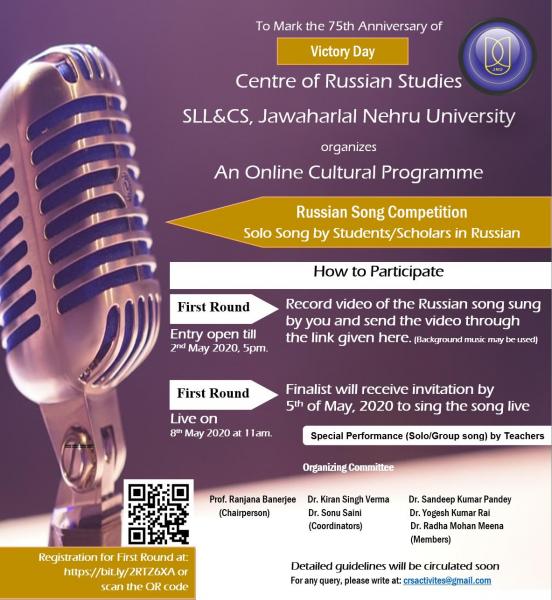
Archive Video of Online Book Release "Theory of Translation" by Prof. Meeta Narain
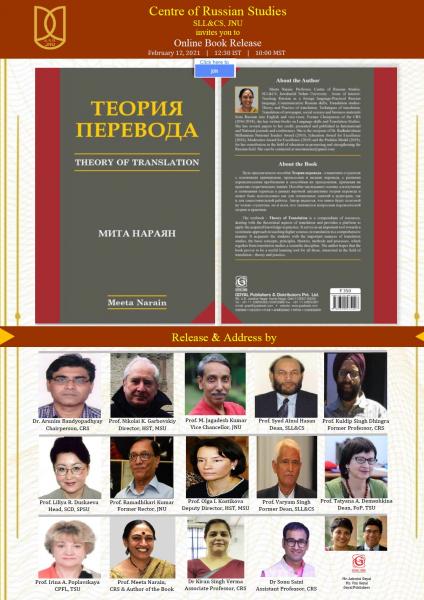
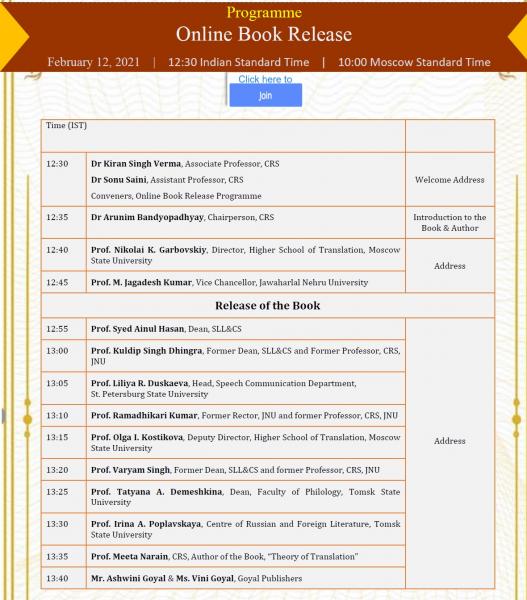
From the section of News, website of THE HIGHER SCHOOL OF TRANSLATION/INTERPRETING
Source: http://esti.msu.ru/pages/about/news/news_662.html
Презентация книги «Теория перевода» Миты Нараян
12 февраля 2021 года Центр русских исследований Университета имени Джавахралала Неру (Нью—Дели, Индия) провел российско-индийский круглый стол, посвященный презентации книги «Теория перевода» Миты Нараян – профессора, заведующей кафедрой Центра Русских Исследований.
В круглом столе приняли участие российские и индийские ученые, чья область научных интересов охватывает как теорию, методологию и дидактику перевода, так и лингводидактику, межкультурную коммуникацию, сравнительное литературоведение, индологию. С докладами и рецензиями выступили представители Московского государственного университета имени М.В.Ломоносова, Санкт-Петербургского государственного университета, Томского государственного университета, Университета имени Джавахралал Неру, Делийского университета и др.
Московский государственный университет имени М.В. Ломоносова был представлен двумя факультетами – Высшей школой перевода и Институтом стран Азии и Африки.
Выступая на торжественном открытии круглого стола, директор Высшей школы перевода профессор Н. К. Гарбовский отметил, несколько аспектов, придающих этой публикации особую ценность. Теория перевода – профессора Миты Нараян – попытка вобрать в себя многолетний опыт российской и западной дидактики перевода и отразить основные аспекты сложнейшего вида общественно значимой когнитивно-коммуникативной деятельности человека. В современную эпоху, когда цифровизация ставит перед человечеством новые вызовы в самых различных областях труд, подобный тому, что вышел из-под пера профессора Нараян, составляет серьезную теоретическую базу, от которой можно оттолкнуться для построения новых методов обучения специалистов, чьи компетенции будут востребованы в цифровом обществе. Автор построила свой учебник таким образом, чтобы отразить в нем все основные необходимые будущим специалистам теоретические и методологические аспекты перевода, изложенные в русле комплексного и достаточно системного подхода, что безусловно относится к сильным сторонам данного методического труда. Важно, что разработка методологических основ осмысленного и рационального перевода в этой книге представлена именно в комбинации с русским языком, что делает учебник важной вехой в деле сближения литератур и культур народов России и Индии. В заключении было отмечено, что этот труд знаменует собой очередной этап на пути межуниверситетского взаимодействия и открывает новые перспективы для дальнейшего взаимодействия с крупнейшим университетом Индии - университетом Джавахарлала Неру.
Продолжая идею Н.К. Гарбовского о межуниверситетском взаимодействии, воплощенном в конкретном результате – новом и востребованном учебнике по теории, методологии и практике перевода, заместитель директора по научной работе Высшей школы перевода доцент О.И.Костикова отметила, что первое знакомство Миты Нараян с Высшей школой перевода произошло еще в 2013 году. Тогда, работая над книгой, профессор Нараян была слушателем инновационного курса повышения квалификации «Дидактика перевода», созданного Высшей школы перевода (факультетом) совместно с Рабочей группой CIUTI. Совершенствуя свои методические навыки преподавания перевода, углубляя знания теории и методологии перевода, знакомясь с новыми направлениями дидактики перевода и новейшими образовательными технологиями в этой области, слушатели имеют прекрасную возможность для установления профессиональных контактов с коллегами, обмена мнениями и опытом по вопросам организации обучения, выбора учебно-методической литературы и создания собственных учебных пособий. Отрадно, что такое взаимодействие, начавшееся в рамках курса повышения квалификации «Дидактика переводческой деятельности» получило активное продолжение и принесло свои плоды.
Выход в свет новой книги – всегда большое событие, тем более, когда речь идет об учебнике. Вспомним слова древнего мудреца: «решетом черпает воду, кто без книг берется за учебу». Чтобы освоить новую науку – нужны учебники, в которых содержится систематическое изложение знаний в области данной науки, чтобы научиться новому виду деятельности – необходимо не только получить знания, но и научиться применять эти знания на практике. Перевод – это особый вид деятельности, один из самых древних, социально востребованных, но и один из самых сложных, требующий специальных когнитивных, коммуникативных, психологических, поведенческих, технологических и пр. умений и навыков. Обучение переводу – долгий, кропотливый и обязательно системный процесс. Как сказал немецкий философ Ф.Ницше «кто хочет научиться летать, тот должен сперва научиться стоять и ходить, и бегать, и лазить, и танцевать: нельзя сразу научиться полету!». Именно в таком ключе задуман учебник «Теория перевода» профессора Центра русских исследований Школы языковых, литературных и культурных исследований Университета имени Джавахарлала Неру, вдумчивого наставника и увлеченного русиста Миты Нараян. Чтобы научить студентов высокому полету в переводе, необходимо заложить основы, прочный фундамент знаний об этом предмете, снабдить обучающихся необходимым инструментарием, который не подведет в трудную минуту и поможет справиться с возникшими проблемами, выработать привычку думать, размышлять, осмысливать, сравнивать, анализировать, критически мыслить и делать выводы, понимать свою роль и место в обществе, уметь делать правильный выбор из множества возможных вариантов.
Поздравляем нашу коллегу со знаменательным свершением и желаем дальнейших творческих успехов!
«Словарь культуры XXI века»: индийское участие
28 декабря 2020 года в Москве состоялась презентация уникального научно-популярного издания, вышедшего на русском языке в индийском издательстве иностранной литературы "Kie Publication" (Хапур). В событии участвовали учёные из нашего университета. Книга, изданная в рамках международного проекта «Словарь культуры 21 века», представляет собой 196-страничный, в твёрдой обложке, дайджест (анонс) первого тома Словаря. Собственно первый том ожидается к выходу в Москве к началу лета 2021 года. Инициатор проекта и составитель Словаря – писатель и антрополог Игорь Сид, выступавший с лекциями в университете в ноябре 2019 года. Научным редактором является Вадим Руднев, автор знаменитого «Словаря культуры 20 века», вышедшего в Москве в 1997 году и выдержавшего множество переизданий.
В презентации участвовали около двадцати из сотни авторов Словаря. Собрание участников проекта с нескольких континентов открыл индийский поэт и переводчик русской литературы, профессор российского Института стран Азии и Африки (факультет Московского госуниверситета) Анил Джанвиджай – инициатор издания дайджеста в Индии. Затем мероприятие вёл Игорь Сид. Первыми выступили несколько наших авторов из Дели – Аруним Байндйопадхиай, Сону Саини, Ранджана Саксена, а также писательница и филолог из Сиднея (Австралия) Татьяна Бонч-Осмоловская. Её словарной статьёй об «Аватаре», термине индийского происхождения, открывается корпус книги.
Таким образом, культурное событие в Москве имело многообразный и очень интересный индийский бэкграунд. Среди выступавших были также авторы из Японии, Португалии, России, Судана и США. Презентация прошла на новой культурной площадке Москвы — в арт-кафе «Нигде Кроме»: название проекта взято из текста Владимира Маяковского. Место знаменито тем, что столетие назад именно в этом помещении проходили творческие акции первых российских футуристов и поэтов «Серебряного века».
Первое издание в книжной серии «Словарь культуры 21 века», вышедшее в "Kie Publication", содержит 84 словарные статьи. Книга является изданием первым и на сегодняшний день единственным в своём роде. В мире всё ещё не существует других книжных проектов, представляющих в единых рамках новейшую международную лексику, связанную с новыми реалиями 21 века. Книга датирована 2020 годом — отчасти именно для того, чтобы этот год, имевший столько неожиданно печальных сторон, приобрёл такую приятную и содержательную новую сторону.
ОСНОВНЫЕ СВЕДЕНИЯ О ДАЙДЖЕСТЕ: Словарь культуры XXI века. Первое приближение. / Хапур: Kie Publication, 2020. — 196 с. ISBN 978-93-81623-87-9
Составление, предисловие – Игорь Сид. Научный редактор Вадим Руднев. Члены редколлегии Анна Бражкина (Россия), Сарали Гинцбург (Испания), Игорь Сатановский (США).
Оформление 1-й страницы обложки и иллюстрация – Игорь Сатановский, 4-й страницы – Алексей Блажко.
АННОТАЦИЯ:
«Словарь культуры XXI века» – научно-популярный проект, дающий представление о феноменах и тенденциях в жизни человечества, возникших, сложившихся или специфически изменившихся в последние десятилетия. Каждая словарная статья раскрывает лексему, являющуюся научно-техническим, социокультурным или бытовым термином, профессиональным или субкультурным арготизмом, слоганом или названием произведения, оказавшего влияние на современную культуру.
В качестве эксперимента добавлен ряд локальных неологизмов – лексемы из разных языков мира, из отдельных субкультур или сленгов, имеющие (по мнению редакции) потенциал международного употребления.
Таким образом, в задачи Словаря входит не только описание нового международного лексикона, но и его проективное расширение.
Авторы Словаря – учёные, эксперты, деятели искусств из Австралии, Армении, Германии, Египта, Индии, Китая, Испании, Латвии, Мадагаскара, Мали, Нидерландов, России, Сенегала, Сербии, США, Украины, Филиппин, Швейцарии, Эфиопии, Японии... — в целом, более чем из 30 стран мира.
Адрес издательства: 117 – Mandi Pacca Bagh, Hapur – 245101 Uttar Pradesh – India Tel.: +91-7017437410 Email: kiepublication1992@gmail.com
Online Lecture of Prof. Meeta Narain at International Centre of Roerich (ICR)
Archive Video: I Workshop on Professional Interpretation | Speakers: Prof. R. Kumar, Prof. Charanjit Singh, Dr. C.V. James
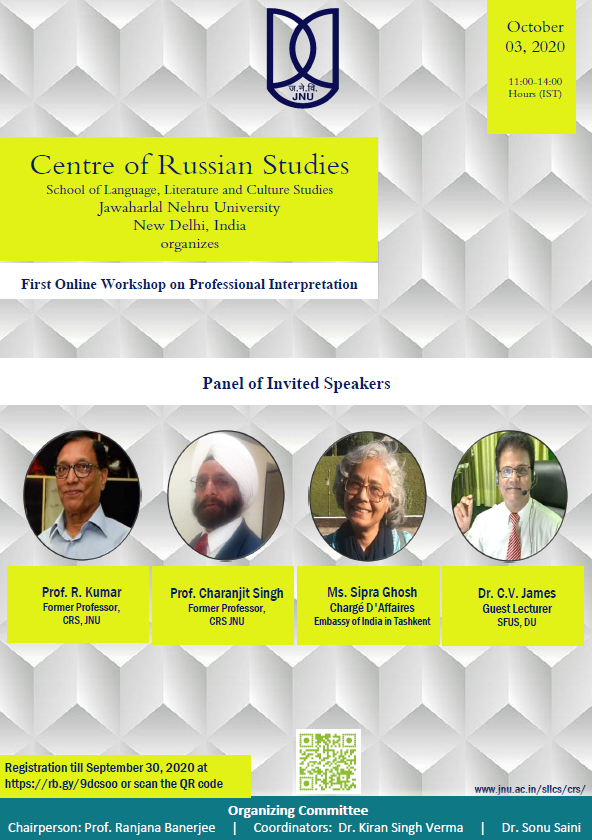
Archive Video: II Workshop on Professional Interpretation | Speakers: Mr. Bhargav Mitra, Mr. B. Vijayababu, Mr. Vasu Valluri
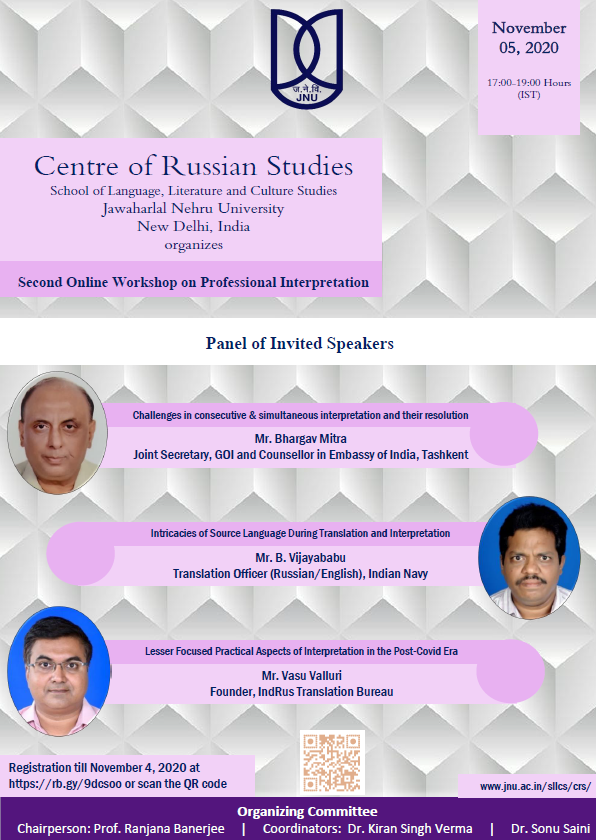
Archive Video: 3-day Online International Conference "Beauty Will Save the World: Dostoevsky and the Indian Aesthetic Tradition" 9-11 March, 2022
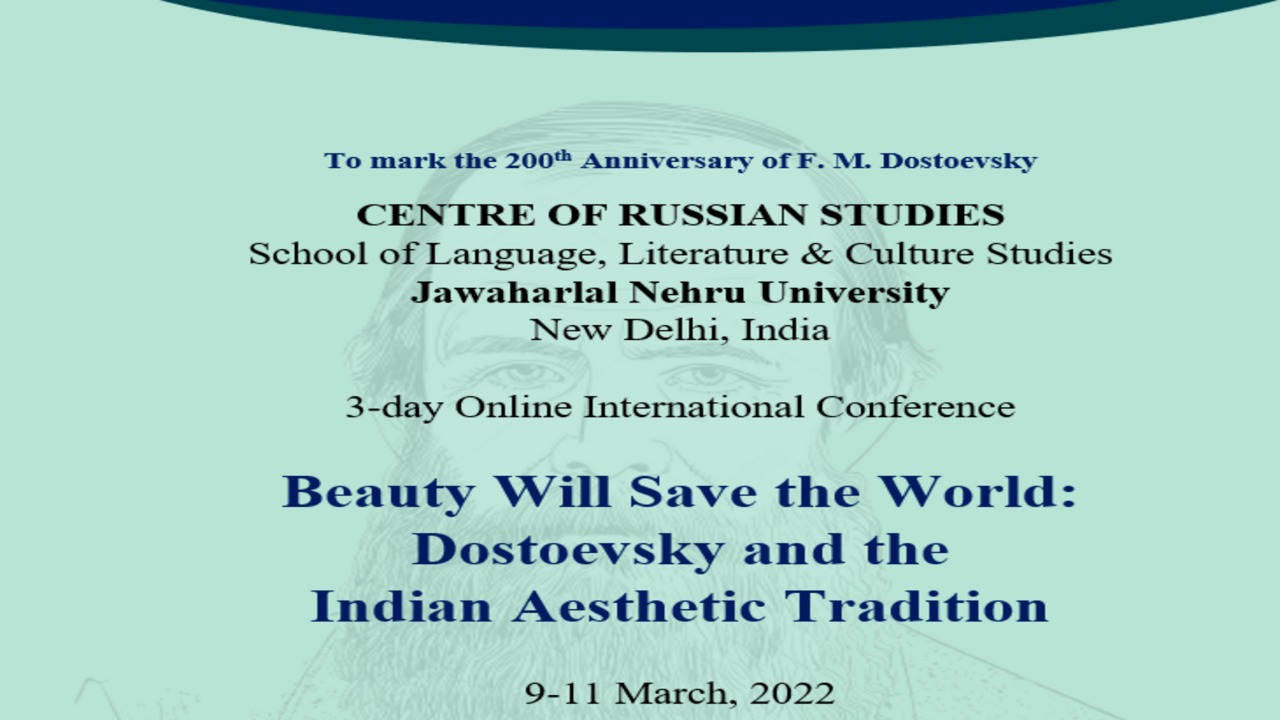
Archive Video: National Young Researchers' Conference 25-26 March, 2022
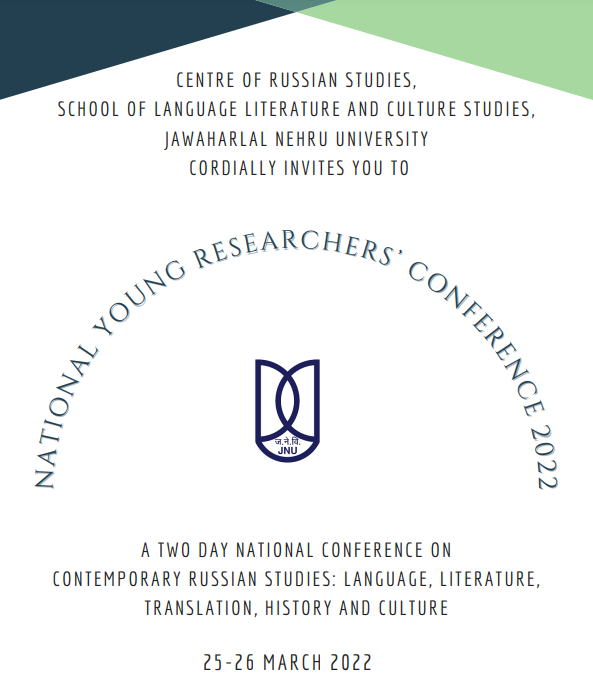
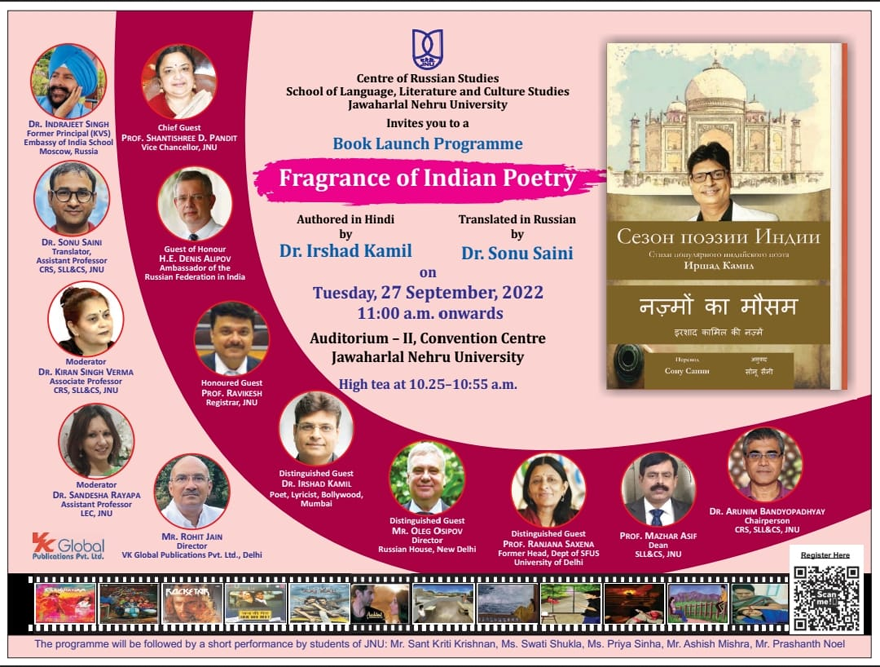
Ambassadors of the Russian language in India!
30th November 2024
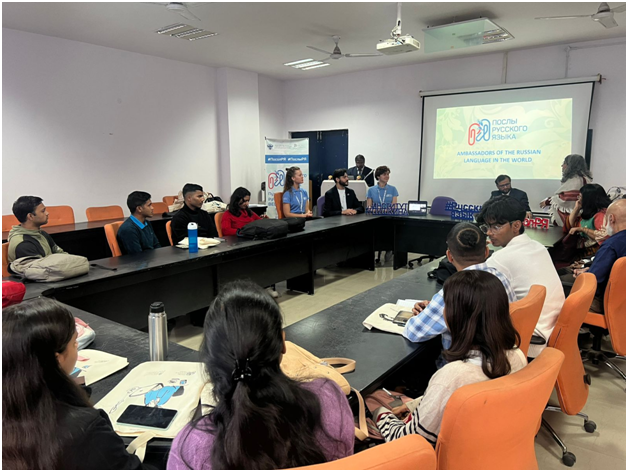
On December 2, 2024, the opening ceremony of the educational expedition of the international volunteer program "Ambassadors of the Russian Language in the World" in the Republic of India took place at the Jawaharlal Nehru University. Acting Dean of the School of Language, Literature and Culture Studies Prof. Mohammad Qutbuddin, Chairperson, Centre of Russian Studies, Prof. Richa Sawant, teachers of CRS, Prof. Nasar Shakeel Roomi, Prof. Ranjana Banerjee, Dr. Kiran Singh Verma, Dr. Ajoy Kumar Karnati, Dr. Vinay Kumar Ambedkar. Honorary Ambassador of the Russian Language, Assistant Professor at the Center for Russian Studies Dr. Sonu Saini and Svetlana Ulyanova, Head of the Department of International Youth Partnership of the Pushkin Institute, Head of the program, addressed the audience in New Delhi via video link from Moscow and welcomed the participants.
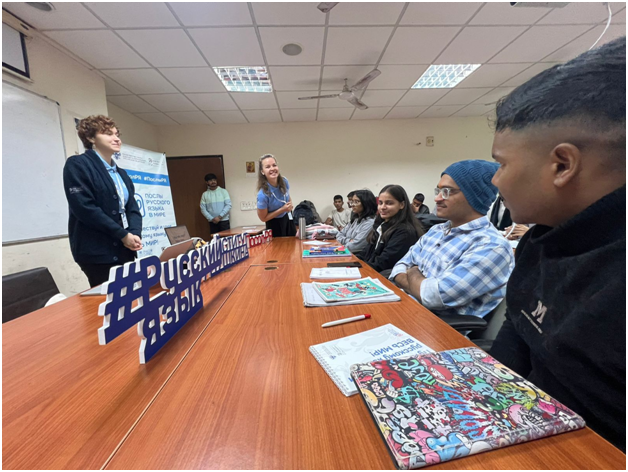
The partners expressed unanimity in maintaining good relations between the Pushkin Institute and Jawaharlal Nehru University, noting that the expedition in India is taking place for the second time in a row, for the organization of which the parties thank the Ministry of Education and Science of Russia.
